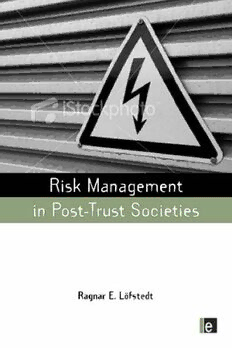
Risk Management in Post-Trust Societies (The Earthscan Risk in Society Series) PDF
189 Pages·2009·0.973 MB·English
Most books are stored in the elastic cloud where traffic is expensive. For this reason, we have a limit on daily download.
Preview Risk Management in Post-Trust Societies (The Earthscan Risk in Society Series)
Description:
We live in "post-trust" societies in which public confidence in governments and corporations over health, food and environmental risks is eroding rapidly. Risk communication helps companies, governments and institutions minimize disputes, resolve issues and anticipate problems before they result in an irreversible breakdown in communication. Without good risk communication and good risk management, policy-makers have no roadmap to guide them through unforeseen problems and this frequently derails the best policies and results in a breakdown in communication and a loss of trust on behalf of those they are trying hardest to persuade.Most policy-makers still use outdated methods–developed at a time before health scares like BSE, genetically modified organisms and dioxins in Belgian chicken feed eroded public confidence in industry and government–to communicate policies and achieve their objectives. This book provides effective methods for managing and communicating risk effectively in post-trust societies.
See more
The list of books you might like
Most books are stored in the elastic cloud where traffic is expensive. For this reason, we have a limit on daily download.
